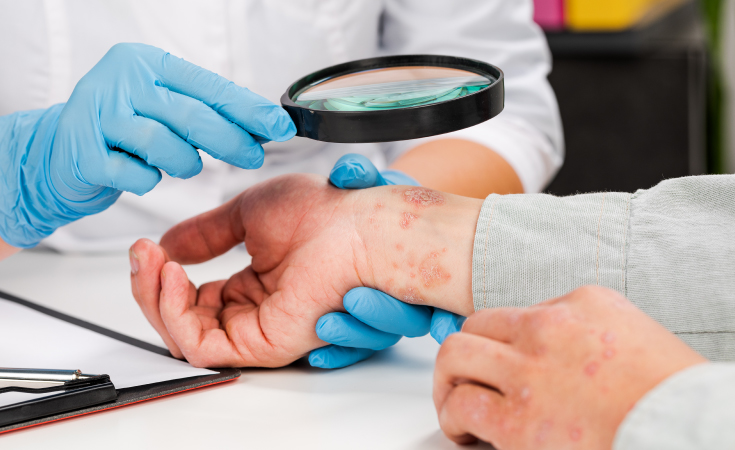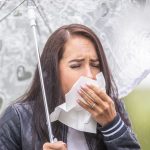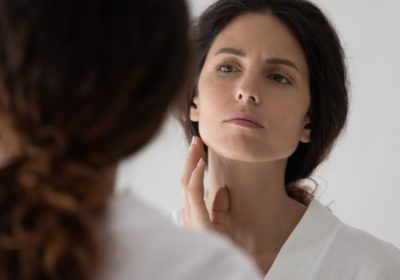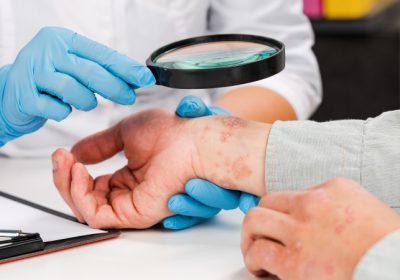
Are Skin Allergy Treatments Effective? Consult Nearest Skin Doctor
Skin allergies can be distressing and disruptive, affecting your quality of life. Consulting a specialized skin allergy doctor is crucial for accurate diagnosis and effective treatment. Understanding the role of a skin allergy doctor and what to expect can help you manage your condition better. Here’s a comprehensive guide on skin allergies and the importance of seeing a specialized doctor.
Table Of Content
- An Overview of Skin Allergy
- Symptoms & Causes of Skin Allergy
- Common Symptoms
- Common Causes
- When Should I Consult the Nearest Skin Allergy Doctor?
- Things to Know About a Skin Allergy Doctor
- Conventional Skin Allergy Treatments
- Medications
- Lifestyle Changes
- Homeopathic Treatment for Skin Allergy
- Common Homeopathic Remedies for Skin Allergies
- Why Dr Batra’s®?
- Self-Help Tips
- Practical Tips for Managing Skin Allergies
- Suitable Skincare Routine
- FAQs
- Talk To An Expert Now
An Overview of Skin Allergy
Skin allergies occur when your immune system reacts to a substance that is typically harmless. These allergens can trigger a variety of symptoms, causing discomfort and irritation. According to the American Academy of Allergy, Asthma & Immunology, skin allergies are quite common, affecting millions of people worldwide.
Symptoms & Causes of Skin Allergy
Common Symptoms:
- Itching
- Redness
- Swelling
- Rashes
- Blisters
- Dry, flaky skin
Common Causes:
- Allergens: Pollen, pet dander, certain foods, and medications.
- Environmental Factors: Pollution, temperature changes, and humidity.
- Contact Irritants: Soaps, detergents, and cosmetics.
When Should I Consult the Nearest Skin Allergy Doctor?
It’s essential to consult a skin allergy doctor when:
- Symptoms persist for more than a few days.
- Over-the-counter treatments are ineffective.
- Symptoms worsen over time.
- The allergy interferes with daily activities.
Early consultation can lead to better management and relief from symptoms, preventing further complications.
Things to Know About a Skin Allergy Doctor
A skin allergy doctor, or allergist, specializes in diagnosing and treating allergic conditions, including skin allergies. Unlike general practitioners, skin allergy doctors have specialized training in identifying the specific allergens causing reactions and providing targeted treatments. They can perform allergy tests, such as skin prick tests or blood tests, to pinpoint the exact cause of the allergy.
Conventional Skin Allergy Treatments
Medications:
- Antihistamines: Reduce itching and swelling.
- Corticosteroids: Alleviate inflammation and redness.
- Immunosuppressants: Used in severe cases to control the immune response.
Lifestyle Changes:
- Avoid known allergens and irritants.
- Use hypoallergenic skincare products.
- Maintain a clean, dust-free environment.
Homeopathic Treatment for Skin Allergy
What is Homeopathy? Homeopathy is a natural form of medicine that uses highly diluted substances to stimulate the body’s healing process.
Can Skin Allergies Be Treated with Homeopathy? Yes, skin allergies can be treated with homeopathy.Homeopathic treatments focus on the root cause of the allergy and provide long-term relief without the side effects of conventional medications.
Common Homeopathic Remedies for Skin Allergies:
- Apis Mellifica: For swelling and itching.
- Rhus Toxicodendron: For rashes and blisters.
- Sulphur: For chronic skin conditions with intense itching.
- Arsenicum Album: For dry, scaly skin with burning sensations.
Why Dr Batra’s®?
Dr Batra’s® is renowned for its expertise in treating skin allergies through both conventional and homeopathic approaches. With years of experience, Dr Batra’s® offers personalized treatment plans tailored to each patient’s specific needs, ensuring effective and long-lasting relief from skin allergies.
Self-Help Tips
Practical Tips for Managing Skin Allergies:
- Identify and avoid allergens.
- Keep the skin moisturized to prevent dryness.
- Wear loose, breathable clothing to avoid irritation.
- Use cool compresses to soothe itching and swelling.
Suitable Skincare Routine:
- Cleanse with mild, hypoallergenic soaps.
- Moisturize regularly to maintain skin hydration.
- Apply sunscreen to protect against environmental triggers.





